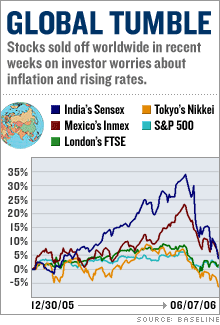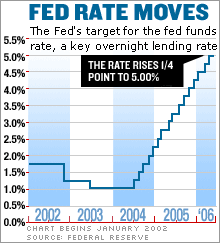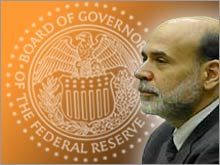Yah.. differcult, it is truth, but as chief of FED, the world biggest economie it is going to go down with him at the helm? jus imagine some like him as Chairman of MAS (singapore) what will happen ??
first time is always difficult...
Well... I guess ten4one is right... we'll see over the years.
Bad start for him though....
Bad start for him though....
I appointed him, he disappointed me...
Give The Man a break - he is just doing his works!
What other options you think Mr B has in order to tame inflations? Print more monies?
Footnote : When Mr Greenspan took over from Mr Paul Volcker, everyone said that Mr. Greenspan was not as good as Paul.......the rest was history (how Greenspan stablilized the Economy better than expected).
Green for today cos GREENspan spoken, hope he can contiune to speak well for DOW to be stablize.
US got 3 branches of governemnt. executive, legislative and judiciary.. FED may be the 4th ?
From CNN -
The Bernanke panic
The Bernanke panic
Rate hikes by the Fed and other central banks have spooked investors around the world. Has the selling been overdone?
By Chris Isidore, CNNMoney.com senior writer
June 8, 2006: 3:06 PM EDT
NEW YORK (CNNMoney.com) - Ben Bernanke isn't just scaring U.S. investors anymore. He's scaring investors around the world.
The recent stock market sell-off accelerated Thursday as investors from Jakarta to Bombay, and from Tokyo to Frankfurt to Wall Street, headed for the exits.
| |||
 | |||
 | |||
|
The worry? That the Federal Reserve, and other central banks, might stall economic growth around the world in their bid to quell inflation.
"Rising interest rates and rising inflation have never been market friendly," said Peter Cardillo, chief market strategist SW Bach. "Global interest rates obviously will dampen global economic activity."
The global rate hiking pandemic started battering stock markets large and small last month, after the Fed raised rates for the 16th straight time, and suggested more rate hikes might be coming. (Full story).
Stock markets at home and abroad have tumbled since that time, with losses running as high as 14 percent for some major indexes, while emerging markets like Bombay and Jakarta have lost from 16 to 26 percent.
"There's a risk that the Fed could make a mistake and raise rates too high, and the worst effects of those fears are being felt in emerging markets and small cap stocks at home right now," said David Joy, chief market strategist for RiverSource, the asset management firm of Ameriprise Financial.
Rate worries spread
The rate hike watch turned overseas Thursday, as the European Central Bank, as well as the central banks in South Korea and India hiked rates, with the rise in India coming between scheduled meetings.
The Bank of Japan has signaled its ready to move away from its essentially zero-interest rate policy of recent years, while more hawkish comments on inflation from new Fed Chairman Bernanke and other policy-makers have raised expectations the Fed will hike rates at its June meeting, and perhaps beyond.
Rate futures at the Chicago Board of Trade, which reflect traders' bets on where the Fed's going on rates, showed a 76 percent chance of another quarter-percentage point hike at the June meeting, up from less than 50 percent on Friday, when a sluggish May jobs report fanned hopes the Fed might pause.
Still, most economists contacted Thursday said they don't think rates are rising high enough to cause a global recession - or even a global bear market - despite the recent sell-off in stock and commodity markets.
"Over the long term equities will be able to absorb the higher rates because (economic) growth is so strong," said Gina Martin, economist with Wachovia.
Some of the fall in the last month is due to investors getting ahead of themselves in betting that the Fed would be done raising rates at its May meeting.
Betting on a rebound
And some economists and market strategists believe that when the Fed does eventually pause later this year, growth will still be enough to help stocks rebound around the world.
"Emerging equities went on quite a tear at the beginning of the year, as investors around the world got very comfortable in April with the idea that the Fed was going to be on hold," said Martin. "It was logical there would be a correction."
Joy at RiverSource agreed, saying that even with rate hikes, strong growth in economies like China and India are likely to keep demand strong for the products of many emerging economies, such as copper, iron and other commodities.
"We think that global growth will remain relatively healthy," said Joy. "This is more of a correction at this point. It could develop into something more serious if central banks, particularly the Fed, misstep and turn a soft landing into a hard landing. But we don't see that happening."
But others say that the rate tightening itself could pose problems for equities, particularly in emerging markets, even if there isn't a serious global economic slowdown.
"Emerging markets have been one of the asset classes that have benefited the most by the excess liquidity that has been sloshing around the globe due to very low interest rates in the U.S., Europe and Asia," said Christian Stracke, head of emerging markets research at Creditsights, an independent financial research firm.
"It wasn't really the strength of the global economy that drove investors into emerging markets. And it's unlikely they'll rebound significantly in the medium to near term."
